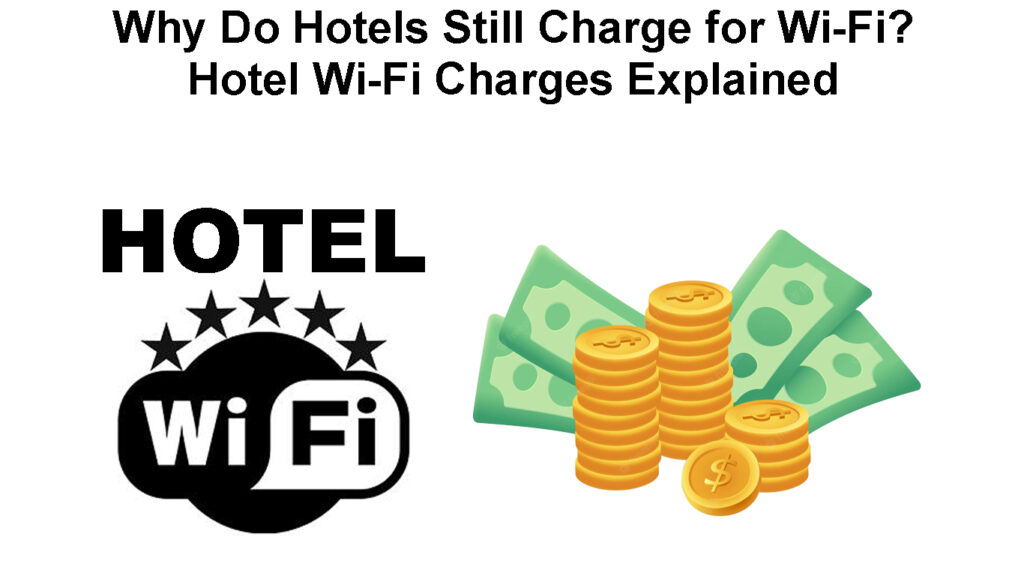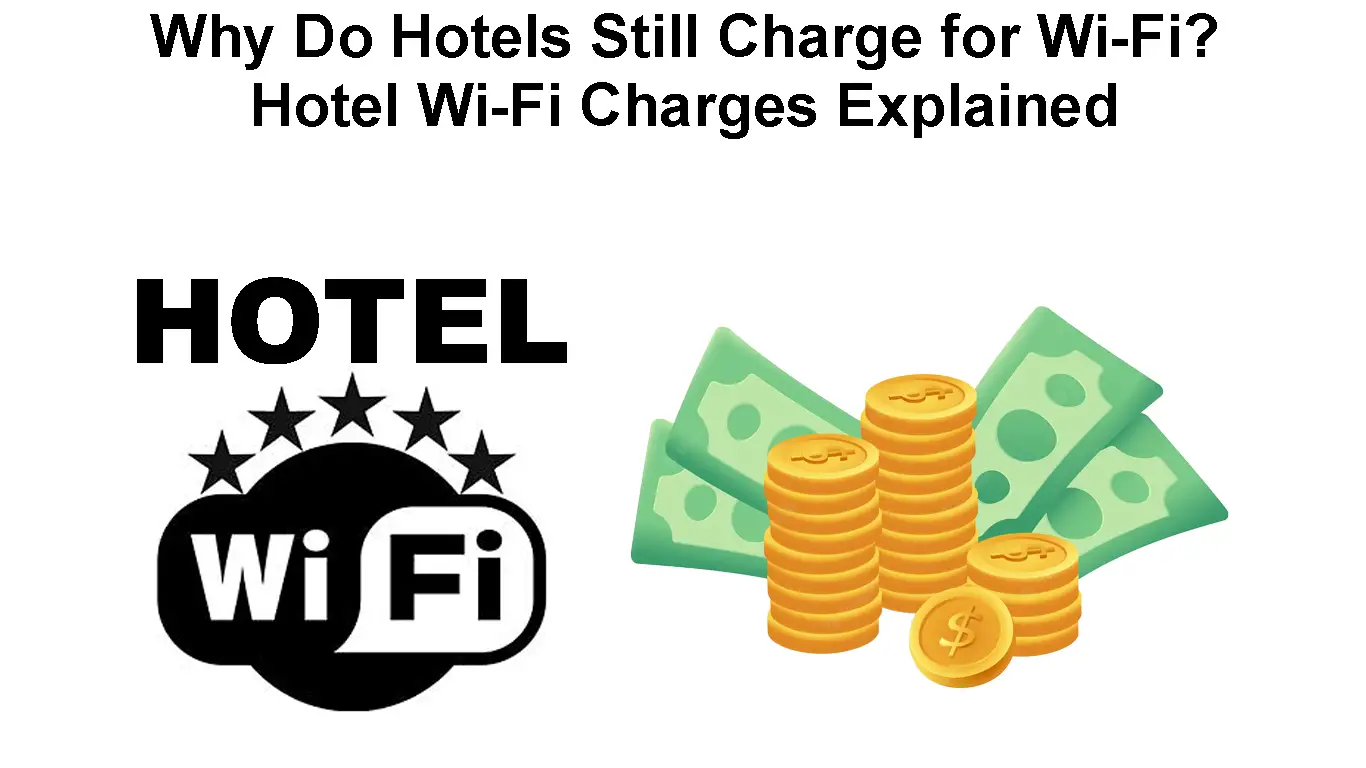According to Statista, free internet access is very important for 73% of leisure travelers. So, why do hotels still charge for Wi-Fi and risk losing loyal guests? You’ll find out today! In this article, we’re exploring all of the major reasons why hotels still charge for Wi-Fi

CONTENTS
The Main Reasons Why Hotels Still Charge for Wi-Fi
1. Wi-Fi Equipment Installation and Maintenance Are Expensive
It goes without saying that Wi-Fi maintenance and installation in a hotel is much more expensive than in regular houses. The majority of hotels use a combination of routers, switches, and access points to ensure that all of the guests have access to the internet. The costs quickly add up as there are charges for both the equipment and installation, as well as additional gadgets that will extend the signal of the wireless network.
In addition, the maintenance of this kind of installation is very expensive. Antennas and cables used usually need to be replaced at least every five years.
Another essential aspect that increases the cost of the equipment in a hotel is the different construction. Hotels usually have various kinds of barriers that a wireless signal has to surpass to reach the hotel guests. For instance, even smaller establishments tend to have soundproof walls. Moreover, various amenities and features that every room also present an obstruction to the connection.
Bearing in mind that a regular, concrete wall, is already a problem for the signal strength, larger constructions and soundproof materials make the situation more serious. So, the equipment a hotel installs has to be of the highest possible quality.
Upgrading Hotel Wi-Fi – Walkthrough
2. The Popularity of Other Services Hotels Charged for is Decreasing
Renting movies and paying to use a hotel telephone used to be a regular occurrence in hotels. It was completely normal to spend extra money for a pay-per-view movie in your room or the ability to use a phone. These services are becoming pretty useless today.
Nowadays, everybody has a phone and access to various streaming platforms they can use when they have a solid internet connection. So, guests that are purchasing pay-per-view movies and paying for phone calls are rare.
So, overpriced phone calls and pay-per-view content used to be among the main sources of income for hotels. This income is now practically non-existent. Thus, it’s becoming more difficult for hotels to find ways to earn money for the extra services they offer to their guests.
Hotels can’t charge their guests for making calls on their own phones or for subscriptions to streaming platforms. What they can do is charge for Wi-Fi, as guests would need it to access the content they are watching in their rooms.
3. Paid Wi-Fi Makes the Rooms Less Expensive
Here’s the truth: there is no such thing as free Wi-Fi in a hotel. The prices of all of the “free” services hotels offer are included in the price of the room. Thus, if your hotel offers free Wi-Fi as an amenity, you can be certain that a percentage of the room price goes for Wi-Fi access.
Budget hotels need to offer their rooms at the lowest possible price. Their main goal is to be at the top of your list when you order accommodation from the lowest to the highest room costs. So, they’ll often exclude the cost of Wi-Fi and then charge you for it when you get to the hotel.
What’s more, a price increase in case Wi-Fi maintenance gets too expensive is much worse for a budget hotel’s business than it is for luxury hotels. If a customer is already paying hundreds or even thousands of dollars per night, they won’t mind an additional $10 for their room.
On the other hand, the situation is different if those 10 bucks present a third of the total price of the room per night. Therefore, it’s more difficult for budget hotels to increase their room prices than it is to charge extra for Wi-Fi.
Lastly, budget hotels often have different kinds of offers based on the guests’ budgets. Just like budget airlines, they offer the simplest service for cheap. Then, if a guest wants a better accommodation experience, they can purchase extra amenities.
4. Guests Don’t Mind
This is a major reason why more expensive hotels charge for Wi-Fi. With a room costing hundreds or thousands of dollars, a $5 or $10 surcharge does not make that much of a difference. Thus, more expensive hotels can charge for extra services, including a stable, strong, wireless signal without angering their customers.
Charging for Wi-Fi separately from the room gives hotels the ability to retain the same price point when it comes to the rooms. In case the Wi-Fi maintenance ends up costing them more, they can just modify the price of this one amenity.
5. The Wireless Signal is Stronger
When Wi-Fi is free, chances are, the majority of the guests will want to make the most of it. On the other hand, Wi-Fi that comes with an extra charge won’t be used by every guest of the hotel. That makes it easier for hotels to ensure that all of their guests who want to use Wi-Fi have the strongest signal possible and a fast internet connection without having to pay for expensive equipment upgrades.
Why Do Hotels Still Charge for Wi-Fi – The Bottom Line
Free Wi-Fi is important to more than two-thirds of leisure travelers. In addition, 98% of American business travelers value free internet access on their trips. That is why charging for Wi-Fi is not the wisest decision a hotel owner could make.
However, as you can see from this post, the situation is not that simple. The installation and maintenance of high-quality Wi-Fi equipment are expensive. In addition, hotels can’t enjoy extra income from pay-per-view movies and telephone calls anymore.
Moreover, paid Wi-Fi is not a big deal for reach travelers and is a great amenity to opt out of for those who travel on a budget. Lastly, paying for Wi-Fi usually means that your connection will be much better, which is essential for those who want to enjoy their favorite content or do business while they’re on a trip.

Hey, I’m Jeremy Clifford. I hold a bachelor’s degree in information systems, and I’m a certified network specialist. I worked for several internet providers in LA, San Francisco, Sacramento, and Seattle over the past 21 years.
I worked as a customer service operator, field technician, network engineer, and network specialist. During my career in networking, I’ve come across numerous modems, gateways, routers, and other networking hardware. I’ve installed network equipment, fixed it, designed and administrated networks, etc.
Networking is my passion, and I’m eager to share everything I know with you. On this website, you can read my modem and router reviews, as well as various how-to guides designed to help you solve your network problems. I want to liberate you from the fear that most users feel when they have to deal with modem and router settings.
My favorite free-time activities are gaming, movie-watching, and cooking. I also enjoy fishing, although I’m not good at it. What I’m good at is annoying David when we are fishing together. Apparently, you’re not supposed to talk or laugh while fishing – it scares the fishes.

